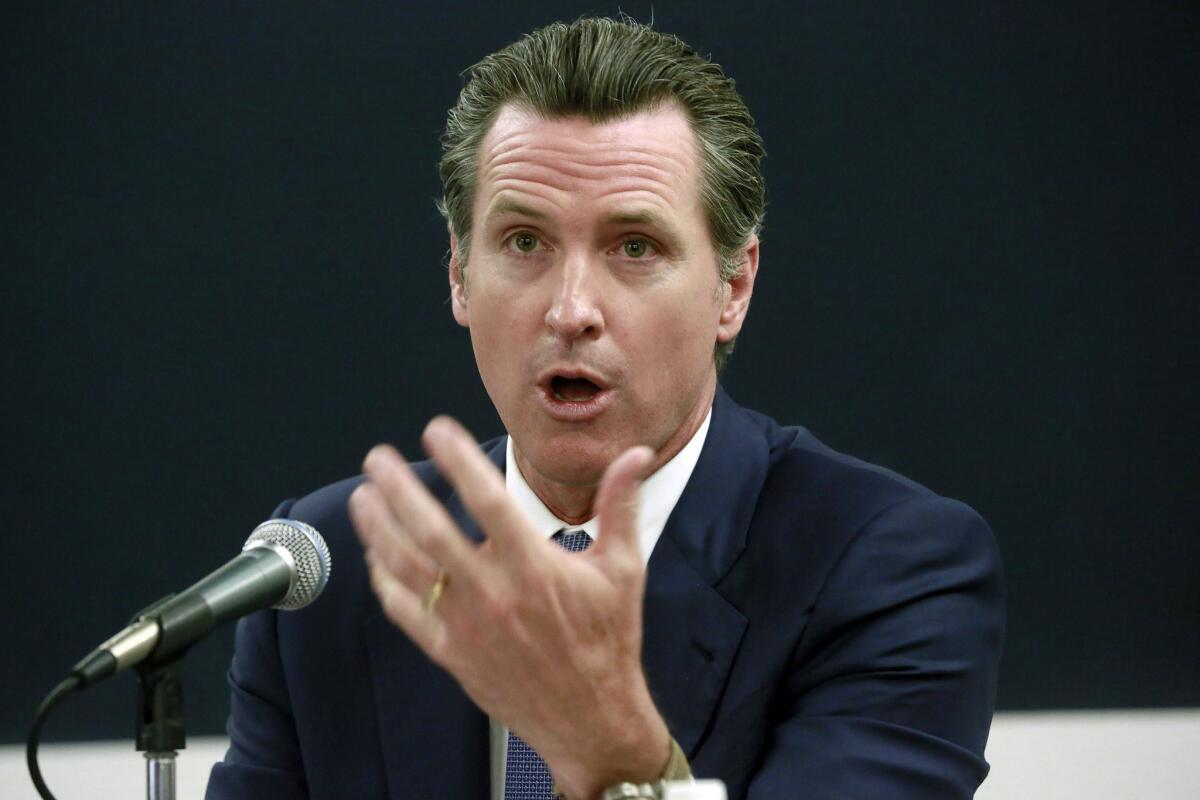Governor gives chief justice broad powers, including suspending laws, during coronavirus crisis

- Share via
SAN FRANCISCO — California Chief Justice Tani Cantil-Sakauye, who was given unprecedented powers by Gov. Gavin Newsom, voted with other judicial leaders Saturday to recommend that courts use remote hearings to get people out of overcrowded jails.
During an emergency meeting of the Judicial Council, Cantil-Sakauye said the lack of court hearings and the closure of state prisons to new inmates has left California’s jails overcrowded in potentially unsafe conditions.
She said she has received “no assurance” that jails in California are practicing social distancing, that inmates can be transported to courthouses with social distancing or that courtrooms can practice it.
“This is about making sure the courts are not vectors,” she said.
Criminal defense lawyers trying to get clients out of jail have complained they have no way to file documents because court clerks have locked their doors.
Under normal circumstances, a defendant must appear for arraignments and preliminary hearings. The recommendation unanimously adopted Saturday calls on courts to use telephonic, audio or video conferencing whenever possible, including for criminal and juvenile proceedings. That includes arraignments and preliminary examinations.
The meeting of the Judicial Council, the policymaking body of the court system, underscored the difficulty of using technology for remote meetings during the coronavirus crisis.
The council’s conference call system initially collapsed because too many people, including the members, the public and the media, tried to get through at once. After about 45 minutes, another system was put in place and the meeting proceeded.
Newsom’s order, issued Friday, gives Cantil-Sakauye extraordinary powers, including the right to suspend laws.
The law is filled with deadlines, many to protect the rights of criminal defendants. There are public access requirements and rules about how legal matters should be conducted.
The governor said on Saturday the executive order was designed to give the judicial branch the flexibility that its leaders had asked for.
“This will allow them the ability, in real time, to meet the needs of the criminal and civil justice system,” he said during a COVID-19 news conference in San Jose.
Cantil-Sakauye said she assured Newsom that the new powers would be assumed “with utmost care and judiciousness.”
She stressed they were temporary and needed to ensure “the justice system will be available to those most in need.”
“The keyword here for all of us is temporary,” said Cantil-Sakauye, who was appointed by former Gov. Arnold Schwarzenegger.
The Judicial Council on Saturday also approved the extension of legal deadlines.
Certain inmates normally have the right to be released if a hearing isn’t held within 10 days. That will be extended to 30 days. Defendants charged with a felony normally must be taken before a judge in 48 hours. The new deadline is seven court days.
With courts largely shut down, 1st Amendment groups have expressed concern that the public will be denied access to documents and proceedings conducted by telephone.
On Friday evening, Cantil-Sakauye issued her own order on how the state’s highest court will hold oral arguments next month.
The order permits only 15 members of the media into its San Francisco courtroom. Journalists will be admitted on a first-come basis and will have to sit six feet apart.
The public will not be admitted but can watch proceedings online at the Judicial Branch website.
To meet social-distancing requirements, no more than five of the court’s seven justices will be seated on the bench. The other two will participate remotely.
Lawyers will make their arguments through video or telephone conference.
Times staff writer Taryn Luna contributed to this report.
More to Read
Sign up for Essential California
The most important California stories and recommendations in your inbox every morning.
You may occasionally receive promotional content from the Los Angeles Times.












